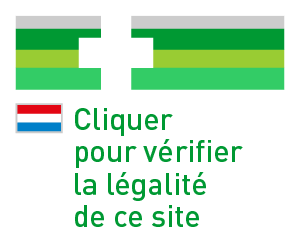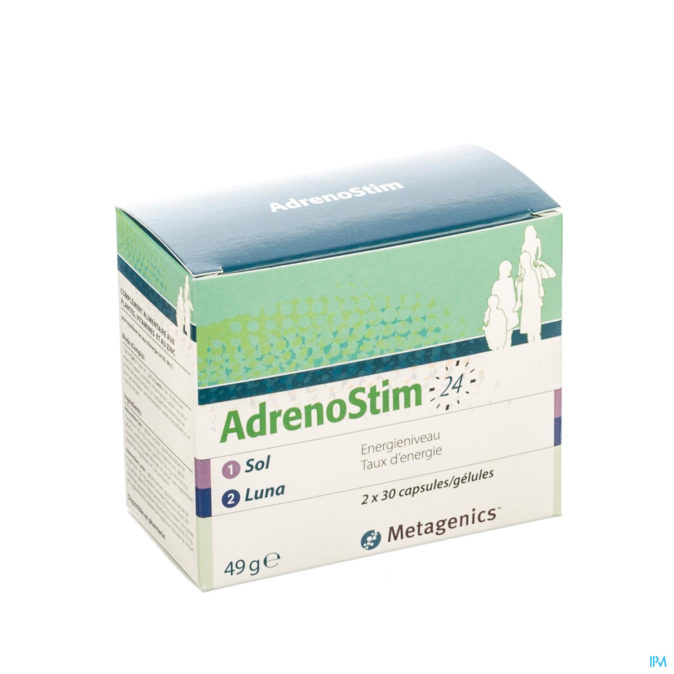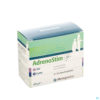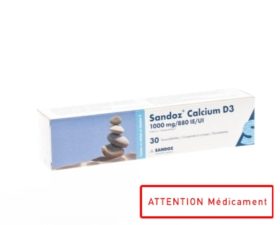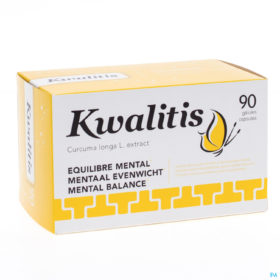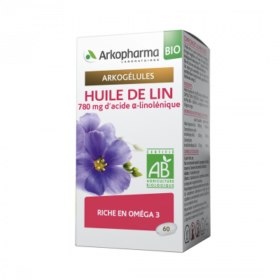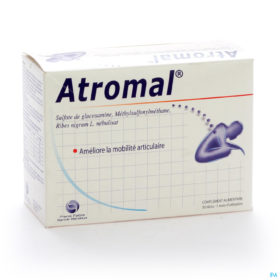Vitamines et compléments nutritionnels
ADRENOSTIM 60 CPR
24.51€
Pas en stock. En réapprovisionnement.
Description
1 capsule Sol ‘s morgens en 1 capsule Luna ‘s avonds of zoals aanbevolen
- Burke, C.W., Adrenocortical insufficiency. Clin Endocrinol Metab, 1985. 14(4): p. 947-76.
- Oelkers, W., Adrenal insufficiency. N Engl J Med, 1996. 335(16): p. 1206-12.
- Jefferies, W.M., Mild adrenocortical deficiency, chronic allergies,
autoimmune disorders and the chronic fatigue syndrome: a continuation of the
cortisone story. Med Hypotheses, 1994. 42(3): p. 183-9. - Kolb, E., [Recent knowledge concerning the biochemistry and significance of
ascorbic acid]. Z Gesamte Inn Med, 1984. 39(2): p. 21-7. - Patak, P., H.S. Willenberg, and S.R. Bornstein, Vitamin C is an important
cofactor for both adrenal cortex and adrenal medulla. Endocr Res, 2004.
30(4): p. 871-5. - Bornstein, S.R., et al., Impaired adrenal catecholamine system function in
mice with deficiency of the ascorbic acid transporter (SVCT2). Faseb J, 2003.
17(13): p. 1928-30. - Pietrzik, K. and D. Hornig, Studies on the distribution of (1-14C)
pantothenic acid in rats. Int J Vitam Nutr Res, 1980. 50(3): p. 283-93. - Fidanza, A., et al., [Effect of high doses of sodium pantothenate on the
production of corticosteroids]. Boll Soc Ital Biol Sper, 1978. 54(22): p.
2248-50. - Tarasov Iu, A., V.M. Sheibak, and A.G. Moiseenok, [Adrenal cortex
functional activity in pantothenate deficiency and the administration of the
vitamin or its derivatives]. Vopr Pitan, 1985(4): p. 51-4. - Datsis, S.A., Effect of pyridoxine deficiency on the adrenal cortex. Exp
Pathol, 1991. 43(3-4): p. 247-50. - Lau-Cam, C.A., K.P. Thadikonda, and B.F. Kendall, Stimulation of rat liver
glycogenolysis by vitamin B6: a role for adrenal catecholamines. Res Commun
Chem Pathol Pharmacol, 1991. 73(2): p. 197-207. - Chan, M.M. and M.R. Kare, Effect of vitamin B-6 deficiency on preference for
several taste solutions in the rat. J Nutr, 1979. 109(2): p. 339-44. - Omura, T. and K. Morohashi, Gene regulation of steroidogenesis. J Steroid
Biochem Mol Biol, 1995. 53(1-6): p. 19-25. - Gupta, R.P., et al., Studies on the pathology of experimental zinc
deficiency in guinea-pigs. J Comp Pathol, 1988. 98(4): p. 405-13. - Rothman, R.J., A.E. Leure-duPree, and G.J. Fosmire, Zinc deficiency affects
the composition of the rat adrenal gland. Proc Soc Exp Biol Med, 1986.
182(3): p. 350-7. - Neve, J., Clinical implications of trace elements in endocrinology. Biol
Trace Elem Res, 1992. 32: p. 173-85. - Durlach, J. and V. Durlach, Speculations on hormonal controls of magnesium
homeostasis: a hypothesis. Magnesium, 1984. 3(3): p. 109-31. - Leonard, B.E., The role of noradrenaline in depression: a review. J
Psychopharmacol, 1997. 11(4 Suppl): p. S39-47. - Kvetnansky, R., et al., Sympathoadrenal system in stress. Interaction with
the hypothalamic-pituitary-adrenocortical system. Ann N Y Acad Sci, 1995.
771: p. 131-58. - Thomson, M., Molecular and cellular mechanisms used in the acute phase of
stimulated steroidogenesis. Horm Metab Res, 1998. 30(1): p. 16-28. - Kimura, Y. and M. Sumiyoshi, Effects of various Eleutherococcus senticosus
cortex on swimming time, natural killer activity and corticosterone level in
forced swimming stressed mice. J Ethnopharmacol, 2004. 95(2-3): p. 447-53. - Davydov, M. and A.D. Krikorian, Eleutherococcus senticosus (Rupr. Maxim.)
Maxim. (Araliaceae) as an adaptogen: a closer look. J Ethnopharmacol, 2000.
72(3): p. 345-93. - Deyama, T., S. Nishibe, and Y. Nakazawa, Constituents and pharmacological
effects of Eucommia and Siberian ginseng. Acta Pharmacol Sin, 2001. 22(12):
p. 1057-70. - Cicero, A.F., et al., Effects of Siberian ginseng (Eleutherococcus senticosus
maxim.) on elderly quality of life: a randomized clinical trial. Arch
Gerontol Geriatr Suppl, 2004(9): p. 69-73. - Nocerino, E., M. Amato, and A.A. Izzo, The aphrodisiac and adaptogenic
properties of ginseng. Fitoterapia, 2000. 71 Suppl 1: p. S1-5. - Hiai, S., et al., Stimulation of pituitary-adrenocortical system by ginseng
saponin. Endocrinol Jpn, 1979. 26(6): p. 661-5. - Tachikawa, E., et al., In vitro inhibition of adrenal catecholamine secretion
by steroidal metabolites of ginseng saponins. Biochem Pharmacol, 2003.
66(11): p. 2213-21. - Tachikawa, E. and K. Kudo, Proof of the mysterious efficacy of ginseng: basic
and clinical trials: suppression of adrenal medullary function in vitro by
ginseng. J Pharmacol Sci, 2004. 95(2): p. 140-4. - Rai, D., et al., Anti-stress effects of Ginkgo biloba and Panax ginseng: a
comparative study. J Pharmacol Sci, 2003. 93(4): p. 458-64. - Kim, D.H., et al., Effects of ginseng saponin administered intraperitoneally
on the hypothalamo-pituitary-adrenal axis in mice. Neurosci Lett, 2003.
343(1): p. 62-6. - Benghuzzi, H., et al., The effects of sustained delivery of diosgenin on the
adrenal gland of female rats. Biomed Sci Instrum, 2003. 39: p. 335-40.
Niet gebruiken in geval van zwangerschap, borstvoeding of hoge bloeddruk.Raadpleeg uw arts of apotheker bij gelijktijdig gebruik van antidiabetische behandeling.
| INGREDIENTEN PER CAPSULE (ADRENOSTIM SOL) | ||
| L-tyrosine | 200.0 mg | |
| Vit. C (ascorbinezuur) | 60.0 mg | 75% |
| Magnesium (glycerofosfaat) | 22.5 mg | |
| Zink (gluconaat) | 22.5 mg | 225% |
| Quercetine | 20.0 mg | |
| Rutine | 20.0 mg | |
| Hesperidine | 20.0 mg | |
| Vit. B5 (calciumpantothenaat) | 18.0 mg | 300% |
| Vit. B6 (pyridoxine HCl) | 6.0 mg | 429% |
| INGREDIENTEN PER CAPSULE (ADRENOSTIM LUNA) | ||
| Wild yam (Dioscorea villosa) | 200.0 mg | |
| Panax ginseng | 100.0 mg | |
| Siberische ginseng (Eleutherococcus senticosus) | 37.5 mg | |
| Magnesium (glycerofosfaat) | 22.5 mg | |
| AdrenoStim Sol: Hulpstoffen: gelatine, magnesiumstearaat AdrenoStim Luna: Hulpstoffen: gelatine, dicalciumfosfaat, magnesiumstearaat, siliciumdioxide *% RI = Referentie Inname |
||






